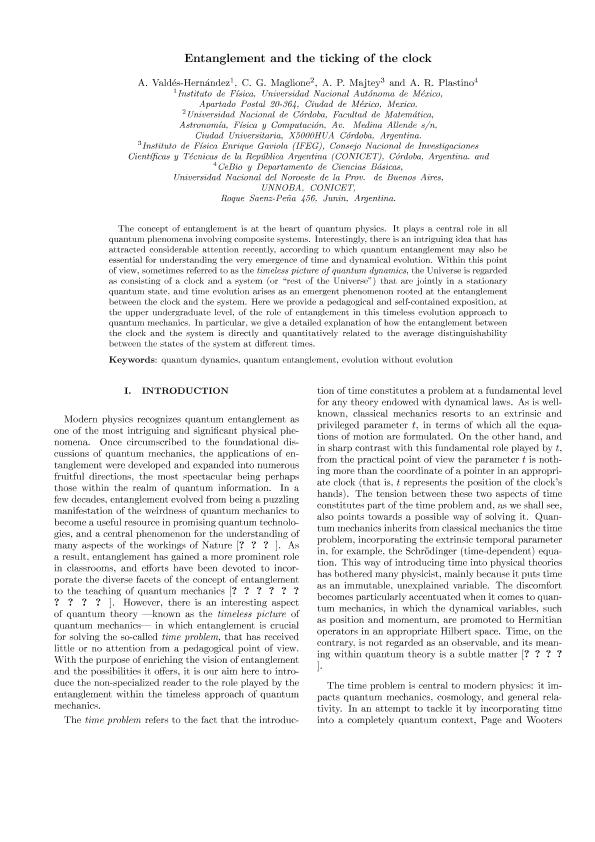Mostrar el registro sencillo del ítem
dc.contributor.author
Valdés-Hernández, A.
dc.contributor.author
Maglione, Cesar German

dc.contributor.author
Majtey, Ana Paula

dc.contributor.author
Plastino, Ángel Ricardo

dc.date.available
2021-11-11T15:51:16Z
dc.date.issued
2020-06
dc.identifier.citation
Valdés-Hernández, A.; Maglione, Cesar German; Majtey, Ana Paula; Plastino, Ángel Ricardo; Entanglement and the ticking of the clock; Sociedade Brasileira de Física; Revista Brasileira de Ensino de Física; 42; 6-2020; 1-11
dc.identifier.issn
0102-4744
dc.identifier.uri
http://hdl.handle.net/11336/146698
dc.description.abstract
The concept of entanglement is at the heart of quantum physics. It plays a central role in all quantum phenomena involving composite systems. Interestingly, there is an intriguing idea that has attracted considerable attention recently, according to which quantum entanglement may also be essential for understanding the very emergence of time and dynamical evolution. Within this point of view, sometimes referred to as the timeless picture of quantum dynamics, the Universe is regarded as consisting of a clock and a system (or "rest of the Universe") that are jointly in a stationary quantum state, and time evolution arises as an emergent phenomenon rooted at the entanglement between the clock and the system. Here we provide a pedagogical and self-contained exposition, at the upper undergraduate level, of the role of entanglement in this timeless evolution approach to quantum mechanics. In particular, we give a detailed explanation of how the entanglement between the clock and the system is directly and quantitatively related to the average distinguishability between the states of the system at different times.
dc.format
application/pdf
dc.language.iso
eng
dc.publisher
Sociedade Brasileira de Física

dc.rights
info:eu-repo/semantics/openAccess
dc.rights.uri
https://creativecommons.org/licenses/by-nc-sa/2.5/ar/
dc.subject
EVOLUTION WITHOUT EVOLUTION
dc.subject
QUANTUM DYNAMICS
dc.subject
QUANTUM ENTANGLEMENT
dc.subject.classification
Otras Ciencias Físicas

dc.subject.classification
Ciencias Físicas

dc.subject.classification
CIENCIAS NATURALES Y EXACTAS

dc.title
Entanglement and the ticking of the clock
dc.type
info:eu-repo/semantics/article
dc.type
info:ar-repo/semantics/artículo
dc.type
info:eu-repo/semantics/publishedVersion
dc.date.updated
2021-09-06T16:45:24Z
dc.identifier.eissn
1806-1117
dc.journal.volume
42
dc.journal.pagination
1-11
dc.journal.pais
Brasil

dc.description.fil
Fil: Valdés-Hernández, A.. Universidad Nacional Autónoma de México; México
dc.description.fil
Fil: Maglione, Cesar German. Universidad Nacional de Córdoba. Facultad de Matemática, Astronomía y Física; Argentina. Consejo Nacional de Investigaciones Científicas y Técnicas. Centro Científico Tecnológico Conicet - Córdoba. Instituto de Física Enrique Gaviola. Universidad Nacional de Córdoba. Instituto de Física Enrique Gaviola; Argentina
dc.description.fil
Fil: Majtey, Ana Paula. Consejo Nacional de Investigaciones Científicas y Técnicas. Centro Científico Tecnológico Conicet - Córdoba. Instituto de Física Enrique Gaviola. Universidad Nacional de Córdoba. Instituto de Física Enrique Gaviola; Argentina
dc.description.fil
Fil: Plastino, Ángel Ricardo. Universidad Nacional del Noroeste de la Provincia de Buenos Aires. Centro de Bioinvestigaciones (Sede Junín); Argentina. Consejo Nacional de Investigaciones Científicas y Técnicas; Argentina
dc.journal.title
Revista Brasileira de Ensino de Física

dc.relation.alternativeid
info:eu-repo/semantics/altIdentifier/url/http://www.scielo.br/scielo.php?script=sci_arttext&pid=S1806-11172020000100448&tlng=en
dc.relation.alternativeid
info:eu-repo/semantics/altIdentifier/doi/http://dx.doi.org/10.1590/1806-9126-rbef-2019-0313
Archivos asociados
